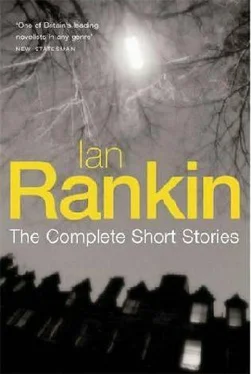‘If it had been only the one,’ Kenneth Leighton was saying, ‘I wouldn’t have minded, but it doesn’t look as though they’re going to stop. Tuesday, then Thursday, then Saturday. I spent all weekend worrying about what to do…’
‘You did the right thing, Mr Leighton.’
Leighton wriggled pleasurably. ‘Well, they always say you should go to the police. Not that I think there’s anything serious. I mean, I’ve not got anything to hide. My life’s an open book…’
An open book and an unexciting one, Rebus would imagine. He tried to shut out Leighton’s voice and concentrated instead on the first letter.
Mr Leighton,
We’ve got photos you wouldn’t want your wife to see, believe us. Think about it. We’ll be in touch.
Then the second:
Mr Leighton, £2,000 for the photos. That seems fair, doesn’t it? You really wouldn’t want your wife to see them. Get the money. We’ll be in touch.
And the third:
Mr Leighton,
We’ll be sending one reprint to show we mean business. You’d better get to it before your wife does. There are plenty more copies.
Rebus looked up, and caught Leighton staring at him. Leighton immediately looked away. Rebus had the feeling that if he stood behind the man and said ‘boo’ quite softly in his ear, Leighton would melt all down the chair. He looked like the sort of person who might make an enemy of his neighbours, complaining too strenuously about a noisy party or a family row. He looked like a crank.
‘You haven’t received the photo yet?’
Leighton shook his head. ‘I’d have brought it along, wouldn’t I?’
‘And you’ve no idea what sort of photo it might be?’
‘None at all. The last time somebody took my picture was at my niece’s wedding.’
‘And when was that?’
‘Three years ago. You see what I’m saying, Inspector? This doesn’t make any sense.’
‘It must make sense to at least one person, Mr Leighton.’ Rebus nodded towards the letters.
They had been written in blue ball-point, the same pen which had been used to address the envelopes. A cheap blue ball-point, leaving smears and blots of ink. It was anything but professional-looking. The whole thing looked like a joke. Since when did blackmailers use their own handwriting? Anyone with a rudimentary education in films, TV cop shows and thriller novels knew that you used a typewriter or letters cut out of newspapers, or whatever; anything that would produce a dramatic effect. These letters were too personal to look dramatic. Polite, too: that use of ‘Mr Leighton’ at the start of each one. A particular word caught Rebus’s attention and held it. But then Leighton said something interesting.
‘I don’t even have a wife, not now.’
‘You’re not married?’
‘I was. Divorced six years ago. Six years and one month.’
‘And where’s your wife now, Mr Leighton?’
‘Remarried, lives in Glenrothes. I got an invite to the wedding, but I didn’t go. Can’t remember what I sent them for a present…’ Leighton was lost in thought for a moment, then collected himself. ‘So you see, if these letters are written by someone I know, how come they don’t know I’m divorced?’
It was a good question. Rebus considered it for a full five seconds. Then he came to his conclusion.
‘Let’s leave it for now, Mr Leighton,’ he said. ‘There’s not much we can do till this photo arrives… if it arrives.’
Leighton looked numb, watching Rebus fold the letters and replace them in their envelopes. Rebus wasn’t sure what the man had expected. Fingerprints lifted from the envelopes by forensic experts? A tell-tale fibre leading to an arrest? Handwriting identified… saliva from the stamps and the envelope-flaps checked… psychologists analysing the wording of the messages themselves, coming up with a profile of the blackmailer? It was all good stuff, but not on a wet Monday morning in Edinburgh. Not with CID’s case-load and budget restrictions.
‘Is that it?’
Rebus shrugged. That was it. We’re only human, Mr Leighton. For a moment, Rebus thought he’d actually voiced his thoughts. He had not. Leighton still sat there, pale and disappointed, his mouth set like the bottom line of a balance sheet.
‘Sorry,’ said Rebus, rising.
‘I’ve just remembered,’ said Leighton.
‘What?’
‘Six wine glasses, that’s what I gave them. Caithness glass they were too.’
‘Very nice I’m sure,’ said Rebus, stifling a post-weekend yawn as he opened the office door.
But Rebus was certainly intrigued.
No wife these past six years, and the last photograph of Leighton dated back three years to a family wedding. Where was the material for blackmail? Where the motive? Means, motive and opportunity. Means: a photograph, apparently. Motive: unknown. Opportunity… Leighton was a nobody, a middle-aged civil servant. He earned enough, but not enough to make him blackmail material. He had confided to Rebus that he barely had £2,000 in his building society account.
‘Hardly enough to cover their demand,’ he had said, as though he were considering actually paying off the blackmailers, even though he had nothing to hide, nothing to fear. Just to get them off his back? Or because he did have something to hide? Most people did, if it came to it. The guilty secret or two (or more, many more) stored away just below the level of consciousness, the way suitcases were stored under beds. Rebus wondered if he himself were blackmail material. He smiled: was the Pope a Catholic? Was the Chief Constable a Mason? Leighton’s words came back to him: Hardly enough to cover their demand. What sort of civil servant was Leighton anyway? Rebus sought out the day-time telephone number Leighton had left along with his home address and phone number. Seven digits, followed by a three-figure extension number. He punched the seven digits on his receiver, waited, and heard a switchboard operator say, ‘Good afternoon, Inland Revenue.’ Rebus replaced the receiver with a guilty silence.
On Tuesday morning, Leighton phoned the station. Rebus got in first.
‘You didn’t tell me you were a taxman, Mr Leighton.’
‘What?’
‘A taxman.’
‘What does it matter?’
What did it matter? How many enemies could one taxman make? Rebus swallowed back the question. He could always use a friend in Her Majesty’s Inland Revenue, for personal as well as strictly professional use…
‘I know what you’re thinking,’ Leighton was saying, though Rebus doubted it. ‘And it’s true that I work in the Collector’s office, sending out the demands. But my name’s never on the demands. The Inspector of Taxes might be mentioned by name, but I’m a lowly cog, Inspector.’
‘Even so, you must write to people sometimes. There might be somebody out there with a grudge.’
‘I’ve given it some thought, Inspector. It was my first thought. But in any case I don’t deal with Edinburgh.’
‘Oh?’
‘I deal with south London.’
Rebus noted that, phoning from his place of work, Leighton was less nervous-sounding. He sounded cool, detached. He sounded like a tax collector. South London: but the letters had local postmarks – another theory sealed under cover and posted into eternity, no return address.
‘The reason I’m calling,’ Leighton was saying, ‘is that I had another letter this morning.’
‘With a photo?’
‘Yes, there’s a photo.’
‘And?’
‘It’s difficult to explain. I could come to the station at lunchtime.’
‘Don’t bother yourself, Mr Leighton. I’ll come to the tax office. All part of the service.’
Rebus was thinking of back-handers, gifts from grateful members of the public, all the pubs where he could be sure of a free drink, chip shops that wouldn’t charge for a feed, all the times he’d helped out for a favour, the way those favours accumulated and were paid off… Tax forms asked you about tips received. Rebus always left the box blank. Had he always been accurate about amounts of bank interest? More crucially, several months ago he had started renting his flat to three students while he lived rent-free with Dr Patience Aitken. He had no intention of declaring… well, maybe he would. It helped to know a friendly taxman, someone who might soon owe him a favour.
Читать дальше












